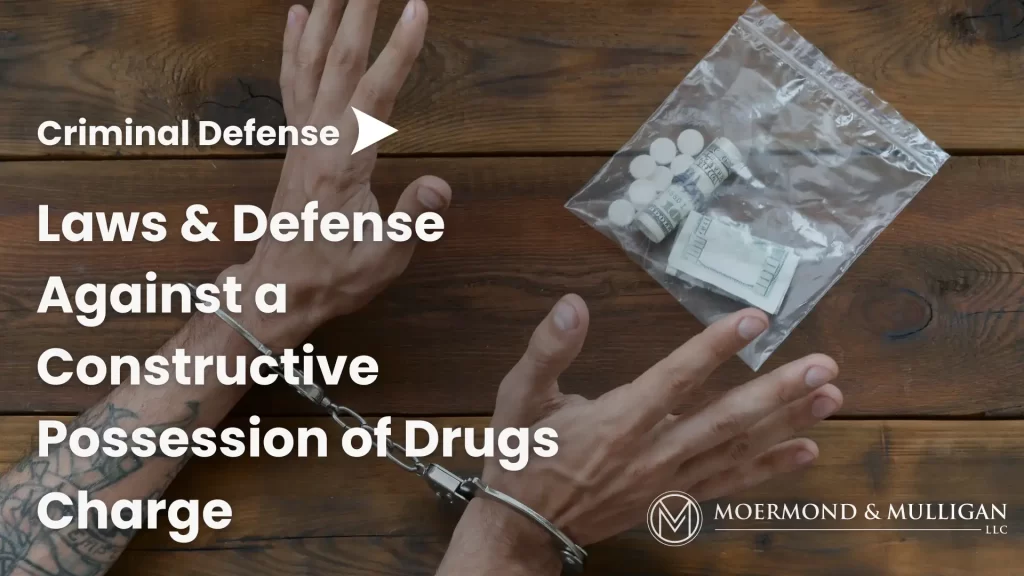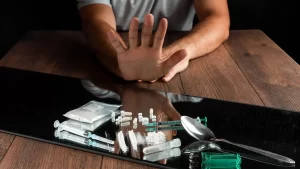Posted on Tuesday, March 12th, 2024 at 8:25 pm

If you’re confronted with constructive possession of drugs charge, it’s natural to feel overwhelmed and uncertain about your legal options. The legal system can be daunting, but gaining a comprehensive understanding of the law and your rights is crucial for safeguarding your future. By arming yourself with knowledge and seeking experienced legal counsel, you can take proactive steps to address the charges against you and work towards the best possible outcome.
What is Constructive Possession?
Constructive possession means that while you don’t have physical control over drugs, you have the ability and intent to control them. For example, if police find drugs in your car or home, even if they aren’t on your person, you could face constructive possession charges. The prosecution must prove that you knew about the drugs and had the power to control them.
To establish constructive possession, the prosecution typically must demonstrate that you knew about the drugs’ presence and that you exercised dominion and control over the location where police found the drugs
Actual Possession vs. Constructive Possession
Actual possession means having drugs directly on your person, such as in your pocket or hand. Constructive possession, on the other hand, applies to drugs found in a place over which you have control, like your bedroom or vehicle. While actual possession cases are more straightforward, constructive possession charges can be more complex and challenging to prove.
The key difference between actual and constructive possession lies in the physical control of the drugs. In actual possession cases, the prosecution must show that the drugs were directly on your person, which is often easier to prove through physical evidence or witness testimony. Constructive possession cases, however, rely on demonstrating your knowledge and control over the area where law enforcement located the drugs, which can be more challenging to establish.
What are the Three Types of Possession?
In drug cases, possession falls under three categories:
- Actual possession: Physical control over the drugs or illegal substances.
- Constructive possession: The ability and intent to control the drugs, even if not physically holding them.
- Joint possession: When two or more people have control over the drugs simultaneously.
Understanding the type of possession you’re facing is crucial for developing an effective defense strategy. Your criminal defense lawyer will analyze the specific details of your case, including the circumstances of your arrest and the evidence against you, to determine the best approach for challenging the prosecution’s case and protecting your rights.
How to Prove Drugs Are Not Yours
 If you are facing constructive possession charges, you might wonder how to prove that the drugs don’t belong to you. Some potential defenses include:
If you are facing constructive possession charges, you might wonder how to prove that the drugs don’t belong to you. Some potential defenses include:
- Lack of knowledge: If you didn’t have knowledge of the drugs that were present, you can argue that you lacked constructive possession.
- No control: If you couldn’t control the drugs, such as if police located them in a shared space or someone else’s property, you may have a defense against constructive possession.
- Illegal search: If the police violated your Fourth Amendment rights by conducting an illegal search, the evidence they found may be inadmissible in court.
Your attorney may also challenge the prosecution’s evidence by questioning the chain of custody, the validity of any search warrants, or the credibility of witnesses testifying against you. By thoroughly examining all aspects of your drug possession charge, your lawyer can identify the most promising defense strategies. This can be done so that they can work tirelessly to protect your rights and interests throughout the legal process.
How to Beat a Constructive Possession Charge
Beating a constructive possession charge requires a strong, well-crafted defense. Some key strategies include:
- Challenging the evidence: Your attorney can examine the prosecution’s evidence and look for weaknesses, such as gaps in the chain of custody or inconsistencies in witness statements.
- Suppressing illegal evidence: If the police officer obtained evidence through an illegal search or seizure, your lawyer can file a motion to suppress that evidence, potentially weakening the prosecution’s case.
- Presenting alternative explanations: Your attorney can offer alternative explanations for the presence of the drugs, such as belonging to someone else or being planted by another person.
- Negotiating a plea deal: In some cases, your lawyer may be able to negotiate with the prosecution for reduced charges or a more lenient sentence in exchange for a guilty plea.
Remember, every illegal drug case is unique, and the best defense strategy will depend on your case’s specific facts and circumstances.
Your lawyer may also present character witnesses or evidence of your positive contributions to the community to demonstrate that the charges against you are inconsistent with your character and history. By painting a picture of who you are, your attorney can persuade the court or jury to view your case more favorably.
Facing a constructive possession of drugs charge can be stressful and intimidating, but you don’t have to navigate it alone. At Moermond & Mulligan, LLC, our skilled Cincinnati criminal defense attorneys have extensive experience handling drug possession cases, including those involving constructive possession.
If you or a loved one faces constructive possession of drugs, don’t wait to seek legal help. Contact Moermond & Mulligan, LLC today for a confidential and free consultation. We’ll listen to your story, explain your options, and provide the aggressive defense you need during this difficult time. Let our law office put our knowledge and experience to work for you.
Related Posts:
Written By: Moermond & Mulligan, LLC
Last Updated: 02-11-2025